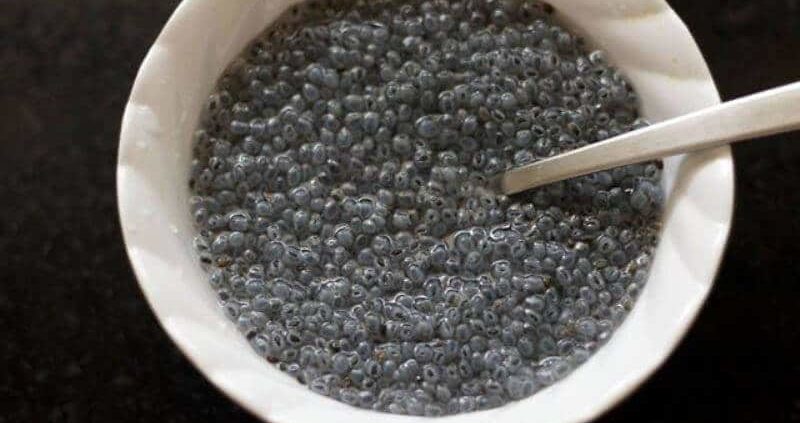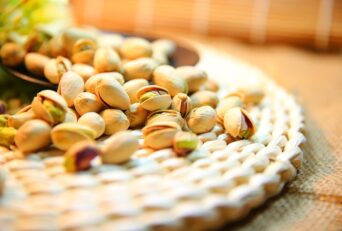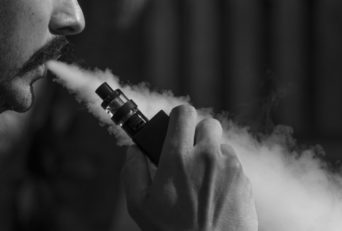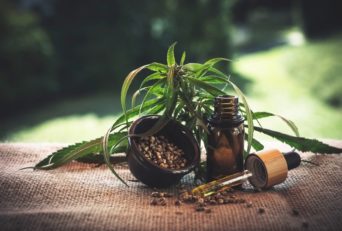In this article, you’re going to discover amazing health benefits of Sabja seeds otherwise known as sweet basil or Tukmaria seed.
The basil plant is native to India and other tropical countries of Asia. The basil plant is also called as sweet basil and is different from the Holy basil plant which is the plant Ocimum tenuiflorum also known as Tulsi in India.
Basil plant, as we all know is very beneficial but what’s more surprising is that its seeds are equally useful too.These black and tear-shaped seeds(not to be confused with chia seeds whose color varies from black to gray and white) are also called as sabja seeds, tukamaria seeds, falooda seeds or sweet basil seeds.
These seeds as found in a lab analysis possesses generous percentage of carbohydrate (42%), fats (25%) and proteins (20%) and are an magnificent source of fibre (In only 4 grams of basil a seed there are more dietary fiber than a whole bulb of lettuce), alpha-linolenic acid (ALA) which comes from the high level of Omega-3 fatty acid present in the seeds. Seeds of Basil contain zero percent calories.
Most of the benefits of Falooda seeds are because it swells twice its size when soaked up in water. Another good thing about these seeds is that they don’t have any unique flavor. So it gives you the advantage of mixing it with any food without requiring the sacrifice of the taste of food in your diet.
These seeds are also used in Ayurvedic and Siddha medicine in India as well as in Chinese medicine.
Health Benefits Of Basil Seed (Sabja Seeds)
There are numerous benefits of basil seeds which you may not know; these are listed below:
1. Sabja Seeds For Weight Loss
Though there is no scientific research to prove that sweet basil seeds aid in weight loss, it has been known that the alpha-linolenic acid (ALA) in the basil seeds helps in boosting the fat burning metabolism of our body.
Also consuming basil seeds will keep you feeling full as these seeds are full of fiber.It can expand 30 times of its original size. Therefore, you won’t feel hunger for a long time.
This is what that will be helping you in losing your weight. You can also use the following methods to bring out the hidden flavor in your basil seed diet to lose weight without having to compromise on taste
Mix with yogurt and top off with some fruit (combine with 100% percent pineapple juice or coconut milk for a tasty drink). Add with seaweeds salad for an easy to make the Japanese-style dressing.
Recommended Time To Eat Basil Seeds For Good Results
Eat Basil seeds before eating a meal to make you feel like your stomach is full and prevent yourself from over-eating.Have as a snack giving yourself a low-calorie alternative to eating sweets.Drink a cup of sweet basil seeds in water to help distract you from the urge to eat.
2. Basil Seeds For Body Heat
Basil seeds act as one of the best body coolants; this is the reason that Basil seeds are usually consumed in the summers.This is also one of the reasons that street vendors who sell edibles based on Basil seeds close their shops in the winter time and reopen it during the summers only. Rose petal jam along with Basil seeds also help in cooling the body.
3. Sabja Seeds For Diabetes
Basil seeds are also said to be effective against type 2 diabetes as it helps in regulation of blood sugar level. Soak Basil seeds in water and mix it with plain cold milk and then add a few drops of pure vanilla into it. You now have an excellent healthy drink without the addition of sugar. You can also add it to other non-dairy milk like almond milk or soy milk too.
4. Sabja Seeds For Constipation
Basil seeds also help with constipation, that is, it acts as a natural body detoxifies by promoting smoother bowel movements. What you only need to do is take some Basil seeds along with a glass of milk before going to bed regularly for a few days to see the results.
5. Tukmaria Seeds For Acidity
Basil seeds have the soothing effect on the stomach. A cup of milk with Basil seeds will do wonders for you if you suffer from acidity or stomach burn. Substitute it for your other drinks, coffee, and tea for a few days to notice a difference. Rose petal jam also helps in treating stomach burn, so give it a try along with Basil seeds.
6. Basil Seeds For Skin
Basil seeds when mixed with coconut oil is very useful for treating skin related problems like eczema, psoriasis and other skin related problems. What you need to do is to make an oil of these seeds. To make the oil, crush the seeds first without soaking it in water. Heat coconut oil in a pan and add the crushed seeds into it and remove from flame after a few minutes.
7. Sabja Seeds For Healthy Skin & Hair
Basil seeds are rich in vitamins, especially vitamin k and help to keep our skin and hair on the top of its health. It is also very rich in iron and protein. A small cup of this Basil seeds will almost satisfy your daily requirement of iron and protein.These seeds also store well. Also, eating basil seeds helps your body secrete collagen which is essential in forming new skin cells.
8. Sabja Seeds For Heart
Alpha-Linolenic acid(ALA), apart from boosting or body’s fat-burning metabolism, is used to make Eicosapentaenoic acid (EPA) and Docosahexaenoic acid(DHA) that are said to help fight heart-related diseases by lowering cholesterol level in the blood.
9. Basil Seeds As Insect Repellent
Basil oil which is prepared by flaming coconut oil with crushed basil seeds also acts as an excellent insect repellent.
10. Basil Seeds For Urinary System Infection
Basil seeds are very useful for curing a bladder infection. What you just need to do is to mix a teaspoon of basil seeds in water and add some honey.
11. Sweet Basil Seeds For Cold & Respiratory Disorder
Basil seeds are also helpful in curing fever, cold, cough, and influenza. These seeds are also part of many herbal products and cough syrups. Just mix honey, ginger and warm water for treatment of respiratory system.
12. Sabja Seeds For Childbirth Pain
Basil seeds (soaked in cold one glass water with one tablespoon of honey) are given to women for reliving childbirth pain following delivery.
Other Health Benefist of Consuming Basil Seeds In Your Diet Are
- These seeds have the calming effect on the brain; that is why they can relieve stress, mental fatigue, depression, and migraine. They also help in elevating our mood.
- Since they have antibacterial properties due to the presence of some essential oils in them, they can apply on cuts, wounds, and infections after they are crushed.
- The anti-inflammatory properties of these seeds benefit by reducing inflammation, pain and swelling in arthritis.
- They can control the formation of plaque in the arteries thereby reducing the risk of stroke and heart attacks to an individual level.
- They also relieve food poisoning and its associated symptoms like nausea and vomiting.
- The antioxidants present in basil leaves and seeds prevent any free radical damage by the impact of UV from sun rays thereby reducing the risk of cancer and degenerative diseases like Alzheimer’s.
- Basil increases the immunity of the body. The flavonoids vicenin, orientin, and beta carotene fortify the body’s defense system.
- They also help with menstrual irregularities.For people who don’t have the time to think about how to incorporate basil seeds into their diet, all you need to do is mix these seeds with water and drink.
Now, as you have seen the pros of Basil seeds, check out the cons of having it in your diet below.
Side Effects Of Sweet Basil Seeds
1.The Visual Appearance-It Looks Like Frog Eggs..!!
Sweet Basil seeds when soaked in water swell twice their sizes which have a gelatinous coating over it. If you feel much worried about the look of these seeds after swelling then try putting these seeds in between your hamburger buns or cookies.
2. It May Prove Harmful For Children
Enlarged or swollen seeds of basil may cause choking or clump in children. To prevent this following should be done: Children should be supervised by adults to avoid any risk. Consumption should be in presence of the adult. Thick clump should be avoided.
3. Not Safe To Consume During Pregnancy
Basil seeds are prone to cause uterine contractions which could lead to miscarriage, so consuming Basil seeds during pregnancy should be avoided. The reason behind such contractions is that Basil comes under “Emmenagogue” which are a family of herbs that stimulate blood flow in the pelvic area and uterus and may, therefore, cause stimulation of menstruation.
Culinary Uses Of Basil Seeds
When soaked in water the basil seeds become gelatinous (which we already know till now) and are used in Asian drinks and desserts such as falooda or Sherbet.
Kheer or ice creams like kulfi can be made with basil seeds. It is added at the last moment, as cooking quickly destroys the flavor of these seeds.
Basil seeds are commonly steeped in cream or milk to create an interesting flavor in ice cream or chocolates (such as truffles).Now, let’s gain our knowledge by knowing some of the common names of Basil seeds that are used in India and abroad.
Nutrients In Basil
Basil contains many poly-phenolic flavonoids especially Orientin and Vicenin. These provide the antioxidant nature to the basil.
Basil leaves are also rich in many essential oils like citronellol, linalool, eugenol, limonene, citral and terpineol. These are responsible for the antibacterial and anti-inflammatory nature of basil.
They have zero percent calorie and are free of cholesterol.They contain high levels of beta-carotene, lutein, zeaxanthin, Vitamin A and Vitamin K.It contains healthful amounts of minerals like potassium, manganese, copper, calcium, and magnesium, and vitamins C and folates.
Are an excellent source of iron at 40% RDA(Reference daily intake) per 100 grams.
Below is the table that provides nutritive value per 100g of basil leaves along with the percentage of RDA(Reference Daily Intake)
(Source: USDA National Nutrient database)
| Principle | Nutritive value per 100g | Percentage of RDA |
| Energy | 23kcal | 1% |
| Carbohydrate | 2.65kcal | 2% |
| Protein | 3.15 g | 6% |
| Total fat | 0.64 g | 2% |
| Cholesterol | 0 mg | 0% |
| Dietary fiber | 1.60 g | 4% |
| Vitamins | NA | NA |
| Folates | 68 mcg | 17% |
| Niacin | 0.902 mg | 6% |
| Pantothenic acid | 0.209 mg | 4% |
| Pyridoxine | 0.155 mg | 12% |
| Riboflavin | 0.076 mg | 6% |
| Thiamin | 0.034 mg | 2.50% |
| Vitamin A | 5275 IU | 175% |
| Vitamin C | 18 mg | 30% |
| Vitamin E | 0.80 mg | 5% |
| Vitamin K | 414.8 mcg | 345% |
| Electrolytes | NA | NA |
| Sodium | 4 mg | 0% |
| Potassium | 295 mg | 6% |
| Mineral | NA | NA |
| Calcium | 177 mg | 18% |
| Copper | 385 mg | 43% |
| Iron | 3.17 mg | 40% |
| Magnesium | 64 mg | 16% |
| Manganese | 1.15 mg | 57% |
| Zinc | 0.81 mg | 7% |
| Phyto-nutrients | NA | NA |
| Beta-carotene | 3142 mcg | NA |
| Beta-Crypto-xanthin | 46 mcg | NA |
| Lutein-zeaxanthin | 5650 mcg | NA |
References:
- http://en.wikipedia.org/wiki/Basil
- http://www.herbsociety.org/factsheets/Basil%20Guide.pdf






